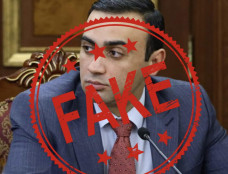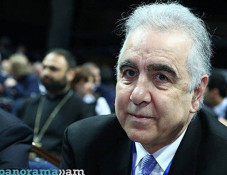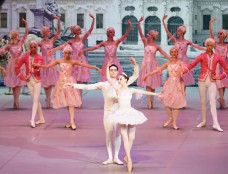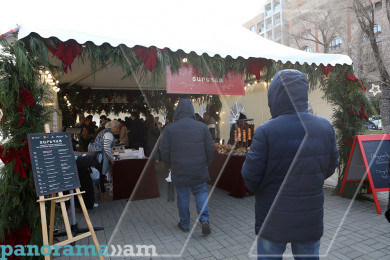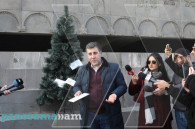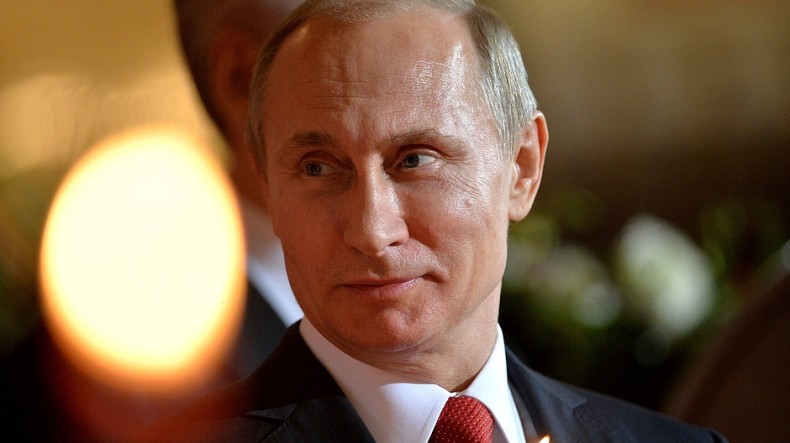
The Financial Times: Russia senses opportunity in Nagorno-Karabakh conflict
Financial Times correspondent in Russia, Jack Farchy published an article concerning the latest events on the Line of Contact between Nagorno Karabakh and Azerbaijan and Russia’s involvement in the verbal agreement on ceasefire between the parties.
“Nagorno-Karabakh militiamen prepare to fire a Howitzer amid the heaviest fighting in the region in decades
As one of Europe’s most intractable conflicts teeters on the brink of war, Russia has gone into diplomatic overdrive.
Fighting between Azerbaijan and Armenia over the mountainous enclave of Nagorno-Karabakh left more than 100 dead earlier this month and plunged a two-decade-old multinational peace process into crisis.
In response, Russian president Vladimir Putin sprang into action, brokering a ceasefire at talks in Moscow and dispatching some of his most senior lieutenants to the region. Analysts and diplomats say Moscow’s move to act as peace broker could allow it to increase its already substantial influence in an energy-rich region that is a key focus of EU plans to diversify gas supplies from Russia.
“Strategically, when the US has been so silent, Putin has filled a vacuum that leaves the impression in Baku and Yerevan that they are alone, that he’s the only game in town,” says Matthew Bryza, a former US ambassador to Azerbaijan.
Nagorno-Karabakh — a mountainous region roughly the size of Luxembourg — lies within the borders of Azerbaijan but is populated by ethnic Armenians. The conflict began in the dying days of the Soviet Union, and expanded into a bloody war that left more than 20,000 dead and 1m displaced. The region has run its own affairs with support from Armenia since a ceasefire in 1994.
When the worst fighting since that ceasefire broke out on the night of Friday April 1, Russia’s foreign and defence ministers were making calls to their Azerbaijani and Armenian counterparts within hours. A few days later it was in Moscow that a truce was hammered out — at a trilateral meeting between the Russian, Armenian and Azerbaijani army chiefs. Days later, the Russian foreign minister and prime minister were in Baku and Yerevan.
Moscow’s energetic diplomacy overshadowed the work of the OSCE Minsk Group — a multilateral body, co-chaired by the US, France and Russia, that since 1994 has been working to find a peaceful solution to the Nagorno-Karabakh conflict. The group did not meet until Tuesday April 5 — by which time Moscow had already brokered a ceasefire agreement.
“It took me by great surprise that it took the OSCE Minsk Group co-chairs a considerable length of time to convene,” says Tahir Taghizadeh, Azerbaijan’s ambassador to London.
Armenia’s foreign ministry, in a written response to questions from the FT, said: “We are grateful for Russian efforts so far and we are hopeful that they will continue until a final resolution is reached.”
Mr Taghizadeh criticises the west’s lack of engagement: “The whole situation with the ceasefire regime not holding any more [ . . . ] is a direct consequence of the inability or unwillingness of the international community to act on this conflict.”
Indeed, US diplomats privately concede that there is little appetite in Washington to launch a new diplomatic push on Nagorno-Karabakh in the waning days of the Obama administration, according to people briefed on their thinking. One western diplomat ruefully recounts requesting satellite images of the Nagorno-Karabakh front lines when the fighting broke out, only to be told that all of the satellites in the region were pointing to Ukraine and Syria.
Still, Nagorno-Karabakh, located at the seam of Europe, Russia, Iran and Turkey, has the potential to destabilise the entire Caucasus region, say analysts.
The EU has tried to forge closer ties with former Soviet states in the region, which is also strategically vital to the bloc as an energy supplier. The main oil pipeline from Azerbaijan to Turkey at one point runs less than 30 miles from Nagorno-Karabakh.
Reconstructing the events of the four-day war is a challenge: there was little or no independent reporting from the front lines during the fighting, and the conflict is the focus of heavy propaganda domestically and internationally for both Armenia and Azerbaijan. Each side accuses the other of starting the fighting. But as Thomas de Waal, an expert on the Caucasus at Carnegie Europe, says, exchanges of fire across the line of contact have become commonplace: “It’s not really the question who fired the first shot, the question is who escalated and why.”
The escalation appears to have been driven by Azerbaijan, which advanced beyond the line of contact to seize new land in the form of a few “strategic heights” — an escalation unprecedented since the 1994 ceasefire.
Mr Taghizadeh confirms as much. Using a metaphor of a homeowner defending his house from squatters, he argues that “you will have to take up the shotgun at some point”.
The result is an increasingly dangerous simmering conflict. “If this isn’t a wake-up call what is,” Mr de Waal says. “This could happen again any time.”
Russia has looked to strengthen economic and political ties with both countries in the wake of the flare-up. In Yerevan last week, Gazprom agreed to extend a gas supply contract with Armenia and cut already low gas prices. In Baku, Sergei Lavrov, Russian foreign minister, discussed a proposed railway line from Russia to Iran via Azerbaijan.
Moscow even appeared to briefly put aside its dispute with Turkey to push for de-escalation: the OSCE Minsk Group, which consists of nine permanent members including both Russia and Turkey, condemned the violence — marking the first time a statement has been issued by the entire group, and not just the co-chairs.
Nonetheless, Russia is not a wholly stabilising influence. Moscow will continue to sell arms to both sides — it is overwhelmingly the largest supplier to both the Azerbaijani and Armenian militaries — deputy prime minister Dmitry Rogozin said this week. And people who have worked on the settlement process say that neither side would have faith in a lasting peace brokered by Moscow alone.
As Mr Bryza, who served as US ambassador to the Minsk Group for three years, says: ‘The key to resolving this is to get the two presidents to have sufficient trust in each other, and Russia is not going to be able to do that’,” reads the article.
Newsfeed
Videos










